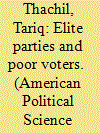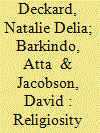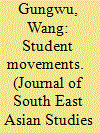|
|
|
Sort Order |
|
|
|
Items / Page
|
|
|
|
|
|
|
| Srl | Item |
| 1 |
ID:
133034


|
|
|
|
|
| Publication |
2014.
|
| Summary/Abstract |
Why do poor people often vote against their material interests? This article extends the study of this global paradox to the non-Western world by considering how it manifests within India, the world's biggest democracy. Arguments derived from studies of advanced democracies (such as values voting) or of poor polities (such as patronage and ethnic appeals) fail to explain this important phenomenon. Instead, I outline a novel strategy predicated on an electoral division of labor enabling elite parties to recruit the poor while retaining the rich. Recruitment is outsourced to nonparty affiliates that provide basic services to appeal to poor communities. Such outsourcing permits the party to maintain programmatic linkages to its elite core. Empirically, I test this argument with qualitative and quantitative evidence, including a survey of more than 9,000 voters. Theoretically, I argue that this approach is best suited to elite parties with thick organizations, typically those linked to religious social movements
|
|
|
|
|
|
|
|
|
|
|
|
|
|
|
|
| 2 |
ID:
139448


|
|
|
|
|
| Summary/Abstract |
Testing social movement theory positing that radical organizations are ideologically driven at their core, but are supported by civilians who are driven by social factors, this research interrogates the disparity between radical group ideology and supporter belief set in the context of present-day Nigeria. Content analysis of randomly selected Boko Haram publications establishes the high, and increasing, levels of religiosity exhibited by the violent social movement itself. In contrast, a large-N survey of Nigerians conducted in 2012 and 2013 shows that high levels of religiosity do not significantly predict willingness to justify violence, commitment to non-state violent actors, or positive attitude toward Boko Haram among Nigerians as a whole, but rather the opposite. Given these findings, Boko Haram may be better understood within the tradition of radical extremist movements across the ideological spectrum, even while it frames its struggle as that of a distinctly religious movement.
|
|
|
|
|
|
|
|
|
|
|
|
|
|
|
|
| 3 |
ID:
124299


|
|
|
|
|
| Publication |
2013.
|
| Summary/Abstract |
For the past three decades, student movements in most countries in the world have been beaten back, but there are signs that some may be returning. In response to the Arab Spring, students participated fully in Tahrir Square and beyond. The student elections in Egypt that followed, however, seem to have been divided according to the various links that each student group had with the political groups contending for state power, like the Muslim Brotherhood and other Islamists on the one side, against secular and revolutionary groups on the other. It is not certain if the student elections really reflected the overall mood of the country or whether they were simply shaped by political protagonists outside the campuses.
|
|
|
|
|
|
|
|
|
|
|
|
|
|
|
|
|
|
|
|
|